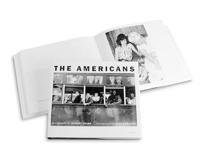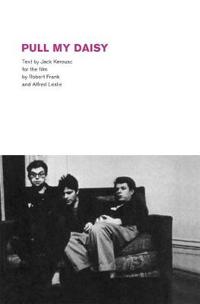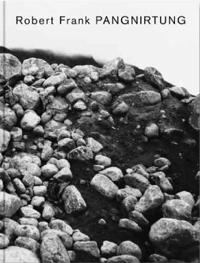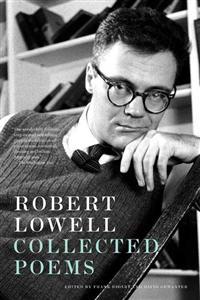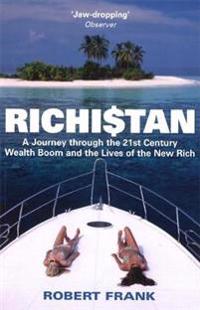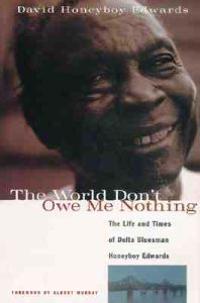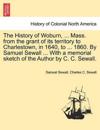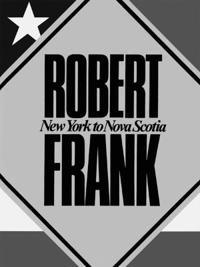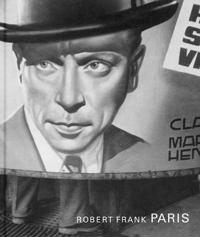Robert Frank: The Americans (Inbunden)
avRobert Frank, Jack Kerouac
ISBN: 9783865215840 - UTGIVEN: 200806Robert Frank (Inbunden)
avRobert Frank, Jack Kerouac, Jerry Tallmer
ISBN: 9783865216731 - UTGIVEN: 2008-08Pull My Daisy is a 1959 short film that typifies the Beat Generation. Directed by Robert Frank and Alfred Leslie, Daisy was adapted by Jack Kerouac from the third act of a stage play he never finished entitled Beat Generation. Kerouac also provided improvised narration. It starred Allen Ginsberg, Gr[...]
Studyguide for Principles of Macroeconomics, Brief Edition by Frank, Robert, ISBN 9780077316761 (Övrig)
avCram101 Textbook Reviews, Robert Frank
ISBN: 9781467274340 - UTGIVEN: 2012-08-03Robert Lowell Collected Poems (Häftad)
avRobert Lowell, David Gewanter, Frank Bidart
ISBN: 9780374530327 - UTGIVEN: 200704The first full collection of Robert Lowell's work introduces readers to the literary genius of the nation's most important postwar poet, including several never-before-anthologized poems, with works frorm Land of Unlikeness, the Pulitzer Prize-winning Lord Weary's Castle, and Day by Day, his final b[...]
Phrase Structure Composition and Syntactic Dependencies (Pocket)
avRobert Frank
ISBN: 9780262562089 - UTGIVEN: 2004-09-07The Economic Naturalist (Häftad)
avRobert Frank
ISBN: 9780465003570 - UTGIVEN: 200803Why do the keypads on drive-up cash machines have Braille dots? Why are round-trip fares from Orlando to Kansas City higher than those from Kansas City to Orlando? For decades, Robert Frank has been asking his economics students to pose and answer questions like these as a way of learning how econom[...]
Frank Lloyd Wright: His Life and His Architecture (Häftad)
avRobert C. Twombly
ISBN: 9780471857976 - UTGIVEN: 1987-06-30Frank Lloyd Wright (Pocket)
avRobert McCarter
ISBN: 9780714838540 - UTGIVEN: 1999-08Frank Lloyd Wright is one of the great masters of modern architecture. His career spanned over 60 years, and his unique stylistic invention kept ahead of any ephemeral fashion. This definitive monograph provides an unparalleled account of Wright's momentous career. It explores the key themes in Wrig[...]
On and By Frank Lloyd Wright (Pocket)
avRobert McCarter
ISBN: 9780714863160 - UTGIVEN: 201201Few architects shaped the course of architectural history as dramatically as Frank Lloyd Wright. While Wright has long been the focus of scholarly debate, among his other many accomplishments during his long career he was also the author of key essays on design that have influenced generations of ar[...]
RICHISTAN (Storpocket)
avRobert Frank
ISBN: 9780749928650 - UTGIVEN: 2008-05In this riveting book, Wall Street Journal reporter Robert Frank explores the lives and lifestyles of a new breed of millionaires and billionaires - many of them self-made and from blue-collar backgrounds - and how this new gilded age is affecting wider society. Profiles of 'instapreneurs', dot-com [...]
The World Don't Owe Me Nothing (Inbunden)
avDavid Honeyboy Edwards, Janis Martinson, Michael Robert Frank
ISBN: 9781556522758 - UTGIVEN: 199709This vivid oral snapshot of an America that planted the blues is full of rhythmic grace. From the son of a sharecropper to an itinerant bluesman, Honeyboy's stories of good friends Charlie Patton, Big Walter Horton, Little Walter Jacobs, and Robert Johnson are a godsend to blues fans. History buffs [...]
The Savage Sword of Conan (Häftad)
avRobert Frank
ISBN: 9781616551483 - UTGIVEN: 2013-09"Give me a sword, I will give you a show." Chained for another man's crime, Conan is sentenced to a Nemedian gladiator arena. While at first the mob howls for Cimmerian blood, the barbarian warrior gives the crowds all the blood they could ever desire. As word of Conan's prowess on the bloody sands [...]
Outlines & Highlights for Microeconomics and Behavior by Robert Frank, ISBN (Häftad)
avAnna Carey
ISBN: 9781617447235 - UTGIVEN: 201012Robert Frank: New York to Nova Scotia (häftad)
ISBN: 9783865210135 - UTGIVEN: 2005-06Ephemera captures our curiosity. Through it, we get a glimpse into the personalities, personal moments and ponderings, and sentiments of beloved public figures. Presented here are many such glimpses, along with several longer looks, into the life of legendary photographer, Robert Frank. New York to [...]
Robert Frank (Häftad)
ISBN: 9783865213631 - UTGIVEN: 2007-01Me and My Brother, Robert Frank's first feature-length film, premiered at the 1968 Venice Film Festival. Everything that had defined Frank's art up to that point is packed into this film--the view of America as if from the outside, the placement of the marginal in a central role, the poetic libertin[...]
Robert Frank (Inbunden)
ISBN: 9783865213648 - UTGIVEN: 2007-03Robert Frank's film One Hour is a single-take of Frank and actor Kevin O'Connor either walking or riding in the back of a mini-van through a few blocks of Manhattan's Lower East side. Shot between 3:45 and 4:45 pm on 26 July, 1990 the film presents the curious experience of eavesdropping involuntari[...]
Robert Frank: The Complete Film Works Vol. 1 (DVD)
ISBN: 9783865213655 - UTGIVEN: 2007-01Robert Franks significant contribution to photography in the mid-twentieth century is unquestionable. His book, "The Americans," is arguably the most important American photography publication of the post-World War II period, and his photography has spawned numerous disciples, as well as a rich crit[...]
Robert Frank (Inbunden)
ISBN: 9783865215246 - UTGIVEN: 200806The publication of Paris marks the first time that the significant body of photographs which Robert Frank made in Paris in the early 1950s have been brought together in a single book. Having left Switzerland in 1924, this 1951 trip to France was only Frank's second return to Europe after he had sett[...]
Robert Frank (Inbunden)
ISBN: 9783865215253 - UTGIVEN: 2008-08Here is volume two of Robert Frank's long-awaited Complete Film Works. At the end of the 1950s, Frank abandoned traditional still photography to become a filmmaker. He eventually returned to photography in the 1970s, but Frank, as a filmmaker, has remained a well-kept secret for almost four decades.[...]
Robert Frank: The Complete Film Works Vol. 3 (DVD)
ISBN: 9783865215918 - UTGIVEN: 2008-06Robert Frank, born in Zurich in 1924, has made, in his 50-year career, an unquestionably significant contribution to photography. His seminal book The Americans is arguably the most important American photography publication of the postwar period. His work continues to influence photographers and ha[...]
Robert Frank
ISBN: 9783865216922 - UTGIVEN: 2008-07Writing from New York in March 1949, Robert Frank sent home to his mother in Switzerland a birthday gift of a book maquette of a series of photographs he had made during a visit to Peru. Frank made an identical book for himself and one of each of these two dummies now resides in the collections of t[...]

